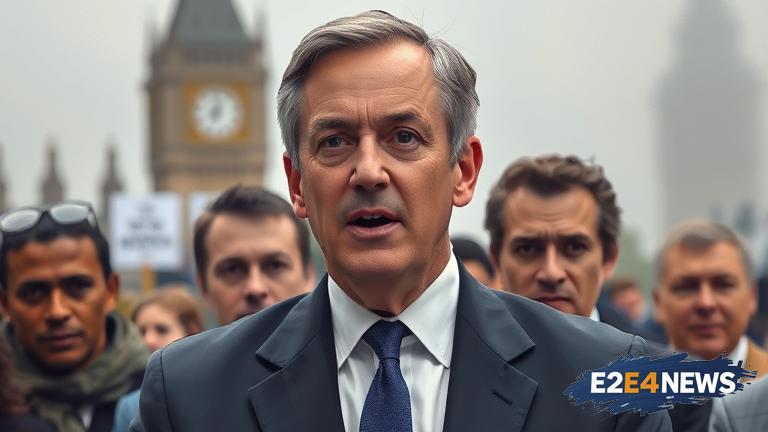Nigel Farage, a prominent British politician, has vowed to scrap the UK Human Rights Law in an effort to tackle the growing crisis of small boats carrying migrants across the English Channel. The move has sparked intense debate on the issue of immigration and human rights in the UK. Farage argues that the current law is being exploited by migrants and their lawyers, allowing them to remain in the country despite having their asylum claims rejected. He claims that the law is preventing the government from effectively addressing the crisis, which has seen a significant increase in the number of migrants attempting to cross the Channel in recent years. The UK Human Rights Law, which was introduced in 1998, incorporates the European Convention on Human Rights into British law, providing protections for individuals against abuse of power by the state. However, Farage and other critics argue that the law has been used to undermine the government’s authority and prevent it from taking effective action against migrants who are deemed to be in the country illegally. The small boats crisis has become a major issue in UK politics, with many calling for tougher action to be taken against migrants and people smugglers. The government has introduced a number of measures aimed at addressing the crisis, including increasing funding for border security and introducing new laws to deter migrants from making the journey. However, critics argue that these measures have been ineffective and that a more radical approach is needed. Farage’s pledge to scrap the UK Human Rights Law has been welcomed by some as a necessary step to tackle the crisis, but others have expressed concerns that it could lead to a erosion of human rights and the rule of law. The issue has sparked a wider debate on the balance between immigration control and human rights, with many arguing that the two are not mutually exclusive. The UK’s human rights record has been the subject of criticism in recent years, with concerns raised over issues such as detention, deportation, and the treatment of asylum seekers. The government has faced criticism from human rights groups and other organizations over its handling of the migrant crisis, with many arguing that its policies are inhumane and ineffective. Despite these concerns, Farage’s pledge to scrap the UK Human Rights Law has been seen as a populist move, aimed at appealing to voters who are concerned about immigration. The issue is likely to remain a major topic of debate in the coming months, with many expecting it to be a key issue in the next general election. The UK’s relationship with the European Convention on Human Rights has been the subject of controversy in recent years, with some arguing that it is incompatible with British sovereignty. The government has faced pressure from some quarters to withdraw from the convention, although this would likely be a highly controversial move. The small boats crisis has also raised questions about the UK’s border security and its ability to effectively police its borders. The government has faced criticism over its handling of the crisis, with many arguing that it has been too slow to respond and that its policies have been ineffective. The issue has also raised concerns about the treatment of asylum seekers and the conditions in which they are being held. Many have argued that the UK’s asylum system is in need of reform, with some calling for a more compassionate and efficient approach to dealing with asylum claims. The debate over the UK Human Rights Law and its impact on the migrant crisis is likely to continue in the coming months, with many expecting it to be a major issue in the next general election. The government will face pressure to take tougher action on immigration, while also being mindful of the need to protect human rights and uphold the rule of law. The issue is complex and multifaceted, and will require a nuanced and balanced approach to resolve. The UK’s human rights record will be closely watched in the coming months, as the government seeks to navigate the complex issues surrounding immigration and border control. The small boats crisis has highlighted the need for a comprehensive and sustainable solution to the issue of migration, one that balances the need to control borders with the need to protect human rights and dignity. The UK government will need to work closely with international partners to address the root causes of migration and to develop a more effective and humane approach to dealing with asylum seekers. The issue is a global one, and will require a global response. The UK’s response to the crisis will be closely watched, and will have implications for its relationships with other countries and its reputation as a champion of human rights. The government will need to be mindful of the need to protect human rights, while also taking effective action to address the crisis. The balance between these two competing interests will be a major challenge in the coming months. The UK Human Rights Law has been an important part of the country’s legal framework for over two decades, and its abolition would be a significant development. The law has provided an important safeguard against abuse of power and has helped to protect the rights of vulnerable individuals. However, its impact on the migrant crisis has been the subject of controversy, and its abolition has been seen as a necessary step by some. The issue is complex and multifaceted, and will require a nuanced and balanced approach to resolve. The UK government will need to work closely with international partners to address the root causes of migration and to develop a more effective and humane approach to dealing with asylum seekers. The small boats crisis has highlighted the need for a comprehensive and sustainable solution to the issue of migration, one that balances the need to control borders with the need to protect human rights and dignity.
